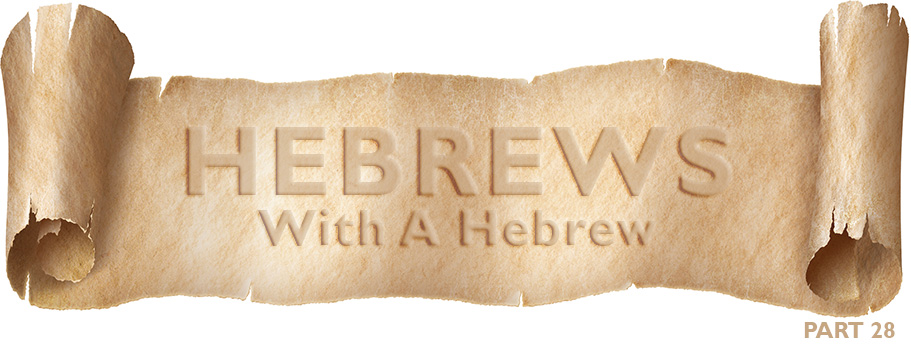For you have not come to what may be touched, a blazing fire and darkness and gloom and a tempest and the sound of a trumpet and a voice whose words made the hearers beg that no further messages be spoken to them. For they could not endure the order that was given, “If even a beast touches the mountain, it shall be stoned.” Indeed, so terrifying was the sight that Moses said, “I tremble with fear.” But you have come to Mount Zion and to the city of the living God, the heavenly Jerusalem, and to innumerable angels in festal gathering, and to the assembly of the firstborn who are enrolled in heaven, and to God, the judge of all, and to the spirits of the righteous made perfect, and to Jesus, the mediator of a new covenant, and to the sprinkled blood that speaks a better word than the blood of Abel.
See that you do not refuse him who is speaking. For if they did not escape when they refused him who warned them on earth, much less will we escape if we reject him who warns from heaven. At that time his voice shook the earth, but now he has promised, “Yet once more I will shake not only the earth but also the heavens.” This phrase, “Yet once more,” indicates the removal of things that are shaken—that is, things that have been made—in order that the things that cannot be shaken may remain. Therefore let us be grateful for receiving a kingdom that cannot be shaken, and thus let us offer to God acceptable worship, with reverence and awe, for our God is a consuming fire.
Hebrews 12:18-29
The writer of Hebrews, in the closing portion of the twelfth chapter, compares the two mountains where God established the two covenants. First, the covenant he made with Israel at Mount Sinai after bringing them out of Egypt, followed by Mount Zion, the mountain David conquered, and where he established his personal dwelling place as well as the tent that housed the ark (II Samuel 5). The description of Sinai the author gives may be summarized by the words fear and terror. The entire scene was designed to cause Israel to literally quake in their boots (“blazing fire and darkness and gloom and a tempest and the sound of a trumpet and a voice whose words made the hearers beg that no further messages be spoken to them (12:19). Eventually, Moses himself who would eventually be invited into God’s very presence. But he himself was overwhelmed with fear saying, “I tremble with fear” (12:21).
But those who partake of the New Covenant have come, not to Sinai, but to Mount Zion. The writer describes this mountain in Davidic terms as “the city of the living God, the heavenly Jerusalem” (Hebrews 12:22). This is a reference to David conquering the mountain, which he subsequently named the city of David (II Samuel 5:6-7). But that was an earthly city; the writer of Hebrews refers to the mountain we have come to as the “heavenly Jerusalem” (12:22). The remaining verses give a vivid description of those who dwell in the city of the living God; “innumerable angels in festal gathering, and to the assembly of the firstborn who are enrolled in heaven” (12:22). Finally, two of the three divine persons are directly mentioned: God, the Judge of all, and to the spirits of the righteous made perfect by the justifying grace of God, “and to Jesus, the mediator of a new covenant, and to the sprinkled blood that speaks a better word than the blood of Abel” (12:24).
The remaining verses (12:25-29) deal with a solemn warning like those that the writer previously spoke of in the letter. It is a warning against closing their ears to him who speaks from heaven as opposed to those who heard his voice from earth—a clear reference to the Israelites hearing God’s voice at Sinai. At that time, almost a million people heard the audible voice of God from the mountain, speaking the ten words (commandments). But now, under the new covenant, God is speaking from heaven. Therefore, it is much more costly for them not to hear the One speaking from heaven than the One who spoke from earth: “For if they did not escape when they refused him who warned them on earth, much less will we escape if we reject him who warns from heaven” (12:25). The writer now reminds them that God warned the people by shaking the earth at Sinai, but now (quoting from Haggai 2:6) he shakes both the heaven and earth.
This verse about God shaking everything in the earth and heaven is often misquoted as referring to a future shaking of these things in the last days. That is not what the author is speaking of. Rather, he speaks of the shaking of the earth and the establishment of the new covenant. “For the people of God, who belong to the order of things which are unshakeable, the removal of all that is insecure and imperfect is something to be eagerly anticipated; for this final shaking of both heaven and earth is necessary for the purging and eradication from the universe of all that is hostile to God and his will, for the establishment of all that, being in harmony with the divine mind, is permanent, and for the inauguration of the new heaven and the new earth, that is, the renewed or changed creation, in which all God’s purposes in creation are brought to everlasting fulfillment at the consummation of the redemption procured by Christ; and this will take place with the return of Christ in glory and majesty” (Revelation 19:11) (The Epistle to the Hebrew, Philipp Hughes, page 558).





0 Comments